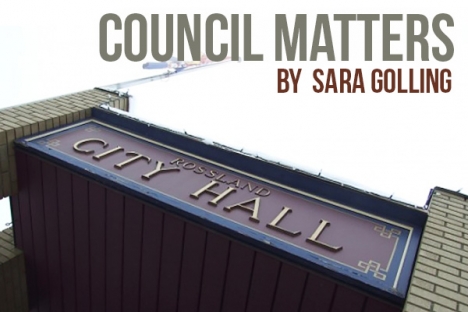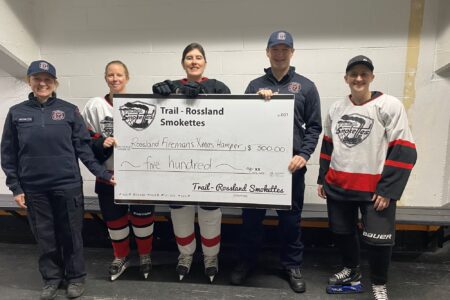Arena hopes; bylaw complaints; LED angst; short-term rentals; no triathlon; stairway joy
Public Hearing and Regular Rossland City Council meeting, August 14, 2017. All Council members were present.
Public Hearing: The proposed amendment to the Official Community Plan would alter the wording for short term rentals, permit temporary use permits with criteria in any part of the City and remove the regulation for no ground disposal of sewage from the OCP (the prohibition already exists in the zoning bylaw).
The gallery was fairly well-populated, but no one spoke for the public hearing.
Regular Council Meeting
Public Input: Red Barn Lodge B&B owner Anthony Bell spoke on his own behalf and on behalf of other licensed B&B operators about the short-term accommodation item on the agenda. He first acknowledged that it isn’t Council’s job to “micromanage the City’s economy” but suggests considering the impacts of City decisions on existing businesses. He urged Council to impose a density limit for guest rooms and suites. He noted that the City has had regulations about short-term rentals in place for years, but no effective enforcement, and suggested that it isn’t realistic to expect Tourism Rossland to police short-term rentals in a few hours twice a year, and that enforcement needs to be ongoing.
Mayor Kathy Moore responded that the City wants to ensure a “level playing field” for accommodators, and also wants to ensure good choice for visitors. She indicated that the City could put new provisions in place, and adjust them after a year if necessary.
Councillor Aaron Cosbey pointed out that the City isn’t there to limit competition, but to make conditions fair among accommodators.
Delegation: Arena Task Force
Janice Nightingale reported for the Arena Focus Study Group, whose vision for the arena is that it be developed to become a community recreation centre for all seasons. How to get there? Nightingale explained that the first step would be installing “a portable spring, summer and fall flooring on the rink surface.” The group sought support from the City for an application for a potential $250,000 “Kraft Heinz Project Play 2017” prize award that could cover the flooring project.
With the proposed all-purpose flooring in place, the arena could host a variety of activities, including roller skating, pickleball, gymnastics, indoor soccer, lacrosse, ball hockey, fitness classes, yoga, zumba, archery, bocce, and more.
A motion to approve applying for the award, and to supply a letter of support, CARRIED unanimously, and Council members congratulated and thanked Nightingale and the focus study group for their work and initiative.
Council Business:
1. Council unanimously passed a motion to award a janitorial services contract for the Miners Union Hall to Fabsolute Floor Care and Janitorial.
2. Complaints about bylaws being broken? There’s a new system.
Council discussed a new policy on Bylaw and Policy Enforcement which gives direction about how complaints from residents will be received and when they will be acted upon. Complaints must be in writing; there is a form that can be filled out on-line, and the required information must be included. The City will not act on anonymous complaints, but the identity of a complainant will be kept confidential unless required for court proceedings, or unless released by order of the Freedom of Information and Protection of Privacy commission.
Council amended the policy at Cosbey’s suggestion to increase staff discretion to cover whether or not to require complainants to supply an e-mail address ― because not everyone has a computer or e-mail service. Councillor Marten Kruysse suggested that staff provide Council with a report on how the policy is working when it has been in place for several months.
Councillor John Greene received clarification on the wording of the policy which requires two complaints about some infractions (except in cases where infractions are noted by the enforcement officer, RCMP or City officials) but was assured that only one complaint is needed from a person located near, and directly affected by, the problem.
A motion to adopt the policy as amended CARRIED unanimously.
3. Council unanimously passed motions confirming two risk management policies in quick succession: Public Works Inspection and Maintenance, and Maintenance and Inspection of Roadways and Sidewalks.
4. Street Lights: Removing some, keeping others, replacing all with LEDs
Rossland has a policy on street lighting (Policy 07 – 03 ― Street Light Policy). Staff have received numerous expressions of concern from residents, and sought further direction from Council on how to proceed. Three options were offered: to continue working with the current approved policy, or to modify the policy to reduce the number of street lights slated for removal ― to remove only those that are clearly redundant ― or to retain the current number of streetlight and simply replace all sodium vapour fixtures with LEDs. All options would save the City $30,000 or more in annual energy costs, but the first option would save the most.
Council discussed the Kelvin rating of the new LED lights, the light output, and directionality of the lights. Resident preferences differ: some would prefer no street lights at all, citing the harm bright street lighting does to wildlife and to people’s sleep patterns, while others want every corner of the City to be well-lit all night, citing safety concerns. Greene mentioned that he has a motion-activated, solar-powered light for his driveway, and that it wasn’t expensive. Councillor Lloyd McLellan said that he thinks the current policy is sound and based on the good research, the cost savings will be substantial, and that staff can make adjustments to the lights to satisfy most complaints. He moved that the current policy be retained.
Cosbey congratulated staff on applying learnings from the Pinewood experiment, and suggested trying to find fixtures with Kelvin ratings lower than 3000. He moved an amendment to add a complaints procedure, but his amendment failed.
Zwicker suggested that a system be put in place for responding to complaints about the changes in street lighting. He noted that some of the complaints he had seen were not fact-based, but rather “fear-of-the-unknown” based, and he suggested bagging lights slated for removal for a longer time than four weeks, to give residents more time to assess the effects.
McLellan said more education was needed about why the changes are being made. Moore agreed that better communication would help. Cosbey agreed that the existing policy should be kept, and that the rationale and criteria for the changes called for in the policy should be explained more clearly. He pointed out, “we aren’t doing this just to save money.”
McLellan moved to continue with the current policy, and the motion CARRIED.
Council and staff discussed criteria for retaining or removing lights, and how to keep some flexibility to deal with “unique circumstances.” Zwicker urged Council not to over-complicate what he saw as a straight-forward matter.
Cosbey moved that Council put in place a dispute resolution process regarding street lights that allows residents to complain if the City has not followed its criteria in the policy, or if there are unique circumstances that should justify an adjustment in the criteria.
The motion for a dispute resolution process CARRIED, with only McLellan opposed.
5. SD 20 / City Reciprocal Recreation Agreement:
A staff recommendation suggested discontinuing the practice of booking after-hours community sports activities held at RSS through the City, so that groups would negotiate directly with SD 20. McLellan argued against the proposal, and Cosbey agreed with him, saying that it would mean most of the activities would not happen. He pointed out that if the activities are booked through Rossland Recreation, they are covered under the City’s insurance, but coordinators booking directly with SD20 would have to buy their own. “If we don’t do it, it doesn’t mean that we can’t do it ― it means we don’t want to do it.”
Moore pointed out that “we’re in transition right now with recreation.” Cosbey acknowledged that the staff proposal is reasonable, in that other communities do it that way. But the motion FAILED unanimously.
6. Development Variance Permit Application: 804 Rossland Cascade Road
The applicant intends to build a new building for light industrial use, and seeks permission to do without the sprinkler system currently required by Rossland’s Building Bylaw. The requirement for a sprinkler system is not in the BC Building Code, and will therefore be void after December 31 of this year, as municipalities are then no longer permitted to impose additional measures in their own building bylaws. Besides, the building will be within 100 metres of a fire hydrant. A motion to approve the application PASSED unanimously.
7. Development Variance Permit Application: 1210 Queen Street
A motion approving the application to reduce the front setback on this large lot from 4 metres to 2.2 metres CARRIED unanimously.
8. Development Variance Permit Application: 2302 Third Avenue
A motion to approve the application CARRIED unanimously. The applicant asked permission to change the roof on the existing garage to a trussed roof, and to add a covered entranceway to the side of house on the property located at 2302 Third Avenue, with the following variances;
• A variance to the exterior side setback from 3 metres to 0 metres – a 3 metre variance.
• A variance to the rear setback from 2 metres to 0.5 metres.
10. Development Permit Application: 1606 Thompson Avenue
The builder plans to construct a duplex on the property; a motion approving his application CARRIED unanimously.
11. Temporary Use Permit: Rossland Search and Rescue
Rossland SAR asked for a temporary use permit to place a storage container on the empty lot at 1925 Third Avenue. The equipment to be stored there was originally in the Rotary Health building, which has been sold, and then moved to the building that the Youth Action Network is renovating for the new youth space. SAR is still actively seeking a permanent location to call home. A motion to grant the temporary use permit CARRIED unanimously.
12. Temporary Use Permit: Red Mountain parking
Red Mountain Resort asked for a temporary use permit to extend parking into areas zoned for other uses. More parking is planned for an area across the highway which is not yet accessible. McLellan said, “This will be for six years. Is there a plan?” Red’s manager, Don Thompson, was present and commented that a lot of vehicles arrive at Red, and the free shuttle “has already had a significant impact on the number of vehicles that drive up from Rossland.” He said that Red’s analysis shows that they need another 200 parking spaces, or to reduce traffic by that amount by “a coordinated, sophisticated transportation system.” He explained “our objective is to have a full-movement intersection at Caldera, with parking on the other side of the highway.”
A motion to grant the temporary use permit CARRIED unanimously.
BYLAWS:
1. The Good Neighbour Bylaw adopted:
A motion to adopt the amended Good Neighbour Bylaw CARRIED unanimously.
2. Official Community Plan Amendment re Short Term Rentals, Septic Systems, and Temporary Use Permits:
Moore proposed a motion to amend the bylaw by adding a provision prohibiting the “ground disposal of sewage within the City’s watershed.” The amendment CARRIED unanimously, and the main motion to give the original OCP amendment third reading CARRIED.
A final motion to adopt the amended OCP amendment CARRIED.
3. Short-Term Rentals Discussion:
Council discussed possible regulations for short-term rental accommodation. The Short-Term Rentals Advisory Committee had prepared a report with recommendations, and the City Planner, Stacey Lightbourne, reviewed that and also made recommendations ― some of which differ from the advisory group’s conclusions.
Points of agreement between the advisory group and Lightbourne were:
· changing the terminology: all short-term rental accommodation would be under the “short-term rental” heading, and there would be three sub-groups: “guest room,” “guest suite,” and “guest home.” There would be no reference to “bed and breakfast” or “tourist accommodation.”
· limiting capacity of a unit to eight guests, to control noise and traffic;
· requiring operators of “guest room” and “guest suite” accommodation to live on the premises, and to show proof of permanent residence to obtain and keep the zoning.
· requiring one off-street parking spot per guest room.
Differences: The advisory committee recommended no density cap on guest rooms and guest suites, and a density cap of one per block on guest homes (not owner-occupied).
Lightbourne recommended that the City should not permit any additional guest homes, that is, rental homes not occupied by the owners, in “the old town” beyond those already existing, zoned and licensed in Rossland. She also stated that there should be a density cap of one per block on the owner-occupied short-term rental properties with guest rooms and guest suites. She explained that her recommendation is designed to protect neighbourhood character and long-term rentals, yet offer sufficient accommodation. She pointed out that at Red base and portions of Redstone, all the housing can be used for short-term rental, and further, that most communities do not allow any short-term rentals of non-owner-occupied homes.
Council also discussed the possibility of acquiring “Host Compliance” software.
Angela Price was invited to speak from the gallery; she spoke of the need for long-term rental properties, and not having them all consumed by illegal short-term rentals; and about the need for fair licensing fees ― she felt that the City should collect more money in fines from the non-compliant rather than from high business fees.
A motion to direct staff to draft the bylaw on short-term rentals on the basis of the staff recommendations CARRIED with only Kruysse opposed, but with a six-month grace period rather than one year, and without the requirement to respond to telephone enquiries within 15 minutes; and without the requirement that all advertising must include a large amount of information about the offering.
Updates:
Water consumption is up; Rossland has used more water this July than in any other July for the past six years.
The Spokane Street― LeRloi Avenue Project is on schedule.
The Spokane Street Covered Stairway (AKA the “LeRoi Stairs”); the stairs stay, for the time being. With that announcement, the hardy souls remaining in the public gallery after over three hours of meeting time spontaneously burst into applause. One said, “I’ve been sitting here all this time just waiting for that news!”
No Triathlon ― a “Quadrathlon” instead
A letter from Keith Robine, Diana Daghofer and Carolyn Buehler explained that the triathlon for which they had sought permission to swim in a City reservoir seemed to be causing too much angst in the community, so they have decided to replace it with an informal “quadrathlon” on September 16. The new event will have a swim in Nancy Greene Lake, followed by a road cycling event to Rossland, then finish with the mountain biking on Paydirt and Redhead trails, and a 10-kilometre trail run.
After brief reports from Council members, the meeting recessed to an in camera session, and your weary reporter walked home in the dark evening, a tiny LED flashlight in hand, contemplating the enormous amount of light pollution generated globally ― little knowing that as this report went on-line, a brand-new, efficient LED street lamp fixture would be freshly installed a few feet from her garage door.
























